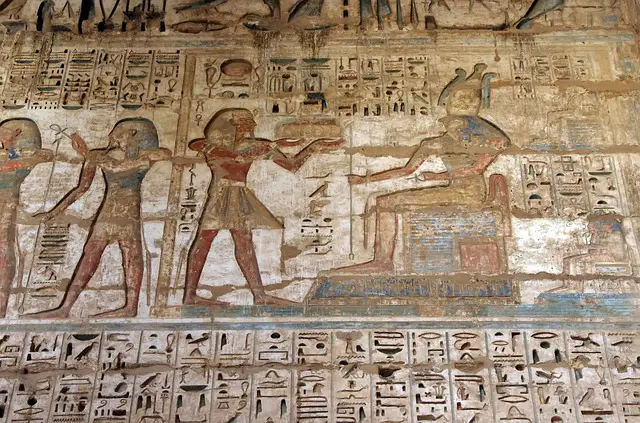THE PROPHET NAHUM
Historic Introduction
The year is around 655 BC and the Assyrian empire is on the rampage under the leadership of King Ashurbanipal.
Exact date is hard to fix but strong evidence is supplied by Nahum 3:8 READ “Are you better than Thebes, situated on the Nile, with water around her? the river was her defence, the waters her wall”.
This means that the city of Thebes had already succumbed to the Assyrian onslaught, at the time of Nahum’s writing.
No-Amon = the Egyptian city of Thebes destroyed 663 bc by the Assyrians themselves.
The northern kingdom of Israel had already succumbed to the forces of Assyria in 722 BC when Samaria their capital city fell.
Assyrians “conquer and divide.”
The Assyrian way of dealing with captive nations was to divide them around the Empire, thereby reducing any chance of rebellion – this is where the ‘ten lost tribes’ were scattered never to be found again.
When the Babylonians conquered the southern kingdom over 100 years later, the occupants were located in one place in Babylon, where they set up the first synagogues and managed to retain their identity. By this means The Lord assured that a ‘remnant’ would return, when all was well.
In 701 Sennacherib laid siege to Jerusalem. However just when things looked at their bleakest, and even Hezekiah himself was clothed in sackcloth and ashes; the Lord delivered them from their enemies resulting in the destruction of 185,000 Assyrian troops, and the eventual murder of Sennacherib in the temple of his gods by his own two sons. Isaiah 37:38
Judah, although still an independent state was in fact-notwithstanding the Grace of God- a vassal of Assyria.
Manasseh was King at this time. The most evil King that Judah had known, he came to the throne after the good king Hezekiah and was so involved with the Assyrian gods that he burned his two sons to death as a sacrifice to the idol Molech. He “filled Jerusalem from one end to the other” with innocent blood 2 Kings 21:16
Reigned 45 years.
Late in his kingship he repented truly of his deeds.
What’s in a name?
Nahum can be translated to mean ‘Consolation,’ and the roll of Nahum does indeed seem to be that of a comforter to Israel, and the nations that Assyria had oppressed.
Very little is known for certain about Nahum, except that he came from Elkosh (1.1) and even then, we do not know where it was exactly.
READ Nahum 1:2-6
“A jealous and avenging God is the Lord;
The Lord is avenging and wrathful.
The Lord takes vengeance on His adversaries,
And He reserves wrath for His enemies.
3 The Lord is slow to anger and great in power,
And the Lord will by no means leave the guilty unpunished.
In whirlwind and storm is His way,
And clouds are the dust beneath His feet.
4 He rebukes the sea and makes it dry;
He dries up all the rivers.
Bashan and Carmel wither;
The blossoms of Lebanon wither.
5 Mountains quake because of Him
And the hills dissolve;
Indeed the earth is upheaved by His presence,
The world and all the inhabitants in it.
6 Who can stand before His indignation?
Who can endure the burning of His anger?
His wrath is poured out like fire
And the rocks are broken up by Him.”
The book itself concentrates on the coming judgement of Nineveh by an angry God !! Including the destruction if the city itself and the futility of trying to avoid or avert this judgement.
Q’s
 1.- Why was God angry?
1.- Why was God angry?
God is not mocked – Galatians 6:7 “Do not be deceived, God is not mocked; for whatever a man sows, this he will also reap”
The Assyrians (Ninevites) that The Lord had forgiven some 100 years ago, (Think of the warnings given through the Prophet Jonah) have resorted to their old ways – in fact they had started to ‘backslide’ shortly after the ascendancy of Tiglath Pileser 111 in 745 BC around 20 years after Jonah’s preach.
In effect they ‘repented of their repentance’ – 2 Peter 2:22 ‘pig returns to wallowing in the mire’ …..False repentance.
- – What did he do about it ?
First of all he sent his prophets, to warn of coming judgement i.e. Nahum, Zephaniah (2:13) Isaiah etc.
Nahum prophesises the fall of Nineveh – inconceivable at the time as it was reputed to be impregnable.
There was however an old Ninevan prophecy that said the ‘City would not be taken until the river became an enemy……….’
During a siege by the Babylonian forces in 614BC the river rose and destroyed a large section of the wall……….
King Esarhaddon 11 on hearing of the breach fled to the palace with his entire harem, his eunuch and all the treasures he could carry and burned them all to the ground!
Nahum 1:8, 2:6 Read
Nineveh the great city is captured and destroyed utterly – lost in the sands until its re-discovery in 1842.
Lessons/Applications for today
- Don’t mess with an angry God.
Fairly obvious – a no-brainer! When he moves in judgement nothing escapes.
- God is slow to anger – but complete in its execution!
- Don’t get him angry to begin with.
One of the ways to avoid this is to ‘let your yes be yes and your no be no’ …James 5:12.
1 Peter 6:5 “God is opposed to the proud, but gives Grace to the humble”
As Christians –followers of Christ, we are told to be examples to the rest of the world. We are the ‘salt of the world’…. Ambassadors for Christ.
- Question … Does God get angry with Christians?
Hmmmmm….. NO! with qualifications (Discuss)
John 3:36 “he who has the Son has life……”
Romans 5:8-11 Read
BUT…. Hebrews 12:6 “those whom the Lord loves he disciplines”
TALK – Discipline of a loving father rather that an angry God.
Hebrews 12:11 Read
“All discipline for the moment seems not to be joyful, but sorrowful; yet to those who have been trained by it, afterwards it yields the peaceful fruit of righteousness.
Whilst we escape the wrath and judgement of an angry God we are nevertheless liable to his discipline.”
Summary.
Nineveh faced the Wrath of an angry God and were destroyed utterly. (The mills of God……) Nineveh sowed the wind of destruction – they must now reap the whirlwind of God’s wrath and judgement !
Christians face the chastisement of a Loving God and are renewed completely.
(2 Cor 5:17) “if any man is in Christ all things have passed away, behold all things have become new”
12 Minor Prophets Book
Next: The Prophet Zephaniah

